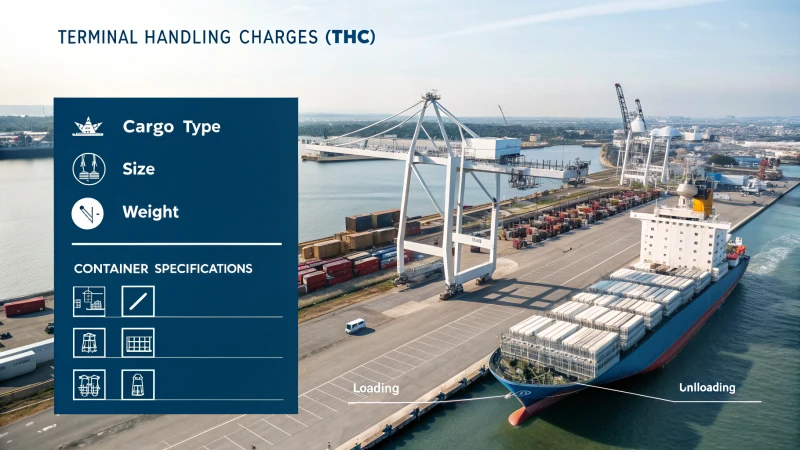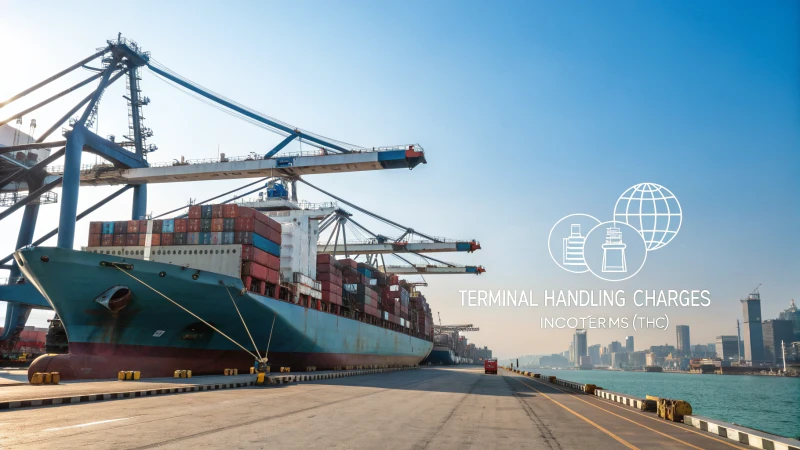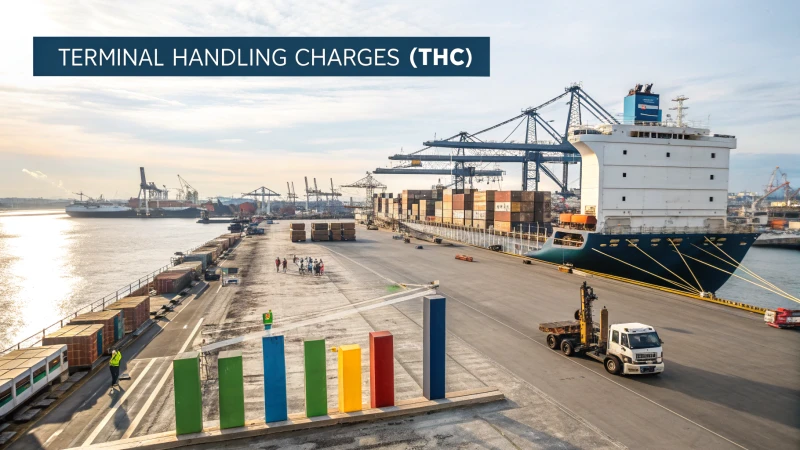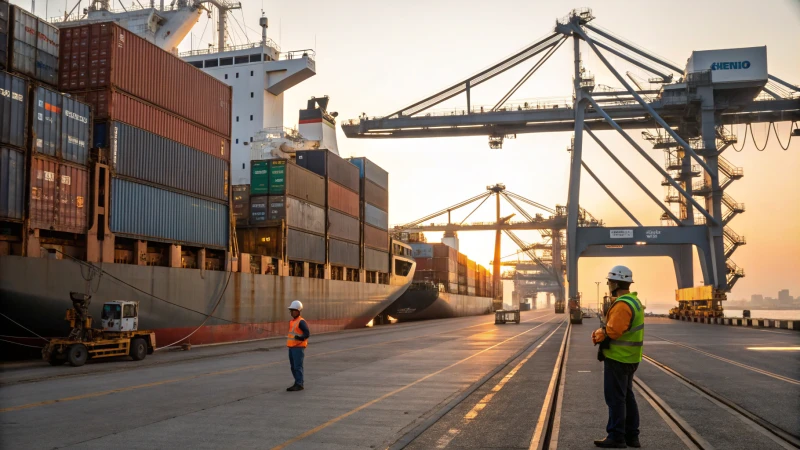Ever felt like you're swimming through a sea of shipping terms? I know the feeling. Let’s unravel Terminal Handling Charges (THC) together.
Terminal Handling Charges (THC) are fees that port operators charge for handling cargo. These costs cover everything from the use of equipment to the manpower needed during loading, unloading, and storage processes.
As someone who runs an e-commerce store, I've learned that understanding THC is crucial for keeping shipping costs in check. These charges can sneak up on you if you’re not careful, impacting your bottom line. Let’s explore how these charges work and why they matter for your shipping strategy.
THC includes costs for cargo storage at ports.True
THC covers handling, including loading, unloading, and storage costs.
Terminal Handling Charges apply only to air freight.False
THC is associated with sea ports and not limited to air freight.
How Are Terminal Handling Charges Calculated?
Ever found yourself lost in the labyrinth of terminal handling charges while trying to manage shipping costs? You're not alone!
Terminal handling charges (THC) are calculated by considering factors like cargo type, size, weight, and container specifics. They cover costs associated with loading, unloading, and storage at the terminal.

Factors Influencing THC Calculation
I remember the first time I had to deal with terminal handling charges (THC). It felt like trying to solve a complex puzzle. These charges cover things like using terminal equipment and manpower, and the specifics can vary widely. Here’s what I’ve learned:
- Cargo Type: Imagine handling fragile glassware versus sturdy metal parts. Fragile items or hazardous materials need special care, which often means higher charges.
- Size and Weight: Think of it like packing for a vacation. The heavier and bulkier your luggage (or in this case, cargo), the more effort it takes to handle it, which affects the cost.
- Container Specifications: Using standard containers is like booking a regular hotel room, predictable and often cheaper. But if your goods need a unique setup, expect to pay more.
Breakdown of THC Components
Here's a more detailed breakdown of what goes into these charges:
| Component | Description |
|---|---|
| Equipment Usage | Cost for using cranes, forklifts, and other machinery. |
| Labor Costs | Fees for personnel involved in handling the cargo. |
| Storage Charges | Fees for storing cargo at the terminal, usually time-based. |
| Administrative Fees | Documentation and management costs associated with processing. |
Every terminal might have its own pricing quirks, so it's a good idea to shop around when planning shipments.
Calculating THC in Different Scenarios
I’ve found that timing can be everything. During peak seasons, terminals might add surcharges1 because everyone’s rushing to ship goods. On the flip side, off-peak times could offer discounts.
Regional differences play a role too. For instance, ports in Asia might have lower labor costs compared to those in Europe, which can significantly alter your budget.
To keep my costs in check, I always stay in touch with my freight forwarder. They often have tips for uncovering cost-saving opportunities2.
Role of THC in Total Shipping Costs
It’s easy to overlook THCs amidst all the shipping jargon, but they’re a crucial piece of the puzzle. Knowing how these charges are calculated helps me budget effectively and avoid those nasty surprises that can derail my shipping plans.
For someone like Linda, who runs an e-commerce store, understanding these fees is vital. It allows her to plan international shipments more efficiently, balancing speed with cost and keeping her business running smoothly.
Cargo type affects terminal handling charges.True
Different cargo types require unique handling, influencing THC.
Standard-sized containers always incur higher THC.False
Standard containers often have fixed rates, not higher charges.
Who Is Responsible for Paying THC?
Ever found yourself staring at a shipping invoice, wondering who should pick up the tab for those elusive Terminal Handling Charges (THC)? Let's unravel this mystery together.
The responsibility for paying Terminal Handling Charges (THC) hinges on the Incoterms set in the shipping contract. Depending on these terms, either the shipper or consignee might be responsible for THC.

Understanding Terminal Handling Charges (THC)
Imagine this: I'm standing at the port, watching cranes glide effortlessly, lifting containers that hold the promise of my next big shipment. But there's a hidden cost to this seamless dance—Terminal Handling Charges. These fees, charged by terminal operators, cover everything from the equipment used to the people ensuring my cargo makes it onto the ship. It's a complex web, and understanding who should shoulder this cost can make or break my shipping strategy.
How Incoterms Determine THC Payment
When I first delved into international shipping, the jargon was overwhelming. Incoterms3—those International Commercial Terms—quickly became my compass. They clearly dictate whether I, as the shipper, or the consignee need to pay specific charges like THC. With options like FOB (Free on Board), CIF (Cost, Insurance, and Freight), and DDP (Delivered Duty Paid), each comes with its own set of responsibilities.
| Incoterm | Shipper Pays THC | Consignee Pays THC |
|---|---|---|
| FOB | Yes | No |
| CIF | Yes | No |
| DDP | No | Yes |
I remember negotiating a deal using FOB, where I had to cover THC at the origin port4. It was a learning curve but knowing that under DDP, the consignee handles it at the destination made future negotiations smoother. With CIF, I took on THC responsibilities both ways, but the peace of mind knowing it was all sorted was invaluable.
Negotiating THC in Shipping Contracts
One lesson I've learned? Never underestimate the power of negotiation when it comes to THC. Before finalizing any contract, discussing these charges with my logistics provider is non-negotiable. For instance, Gofreighter5 offers options that can ease these costs—something I always explore.
Potential Cost Implications
Being savvy about who pays THC can dramatically influence my bottom line. For someone running a niche e-commerce store like mine, managing these costs effectively isn't just about savings; it's about ensuring a seamless logistics journey6. By zeroing in on Incoterms, I can strategically decide who should bear THC, enabling me to make informed decisions that optimize my supply chain strategy.
Under FOB, the consignee pays THC at the destination.False
In FOB, the shipper pays THC at the origin port.
CIF requires shippers to pay THC at both ports.True
CIF places THC responsibility on the shipper at both ends.
What Are the Key Components of THC?
Have you ever stopped to wonder what makes THC tick?
THC, or tetrahydrocannabinol, is a fascinating molecule made of carbon, hydrogen, and oxygen. These elements combine into a special shape that connects with our brain's cannabinoid receptors, sparking the psychoactive effects we know.
Chemical Structure of THC
I remember the first time I tried to wrap my head around the intricate dance of atoms in THC. It’s pretty wild when you think about it—21 carbon atoms, 30 hydrogen atoms, and two oxygen atoms all coming together to form this cyclic ring. That’s what allows THC to interact with our endocannabinoid system7. And the hydroxyl group (OH) is like the key that fits into our brain's lock.
| Element | Atomic Number | Function in THC |
|---|---|---|
| Carbon | 6 | Forms the backbone |
| Hydrogen | 1 | Stabilizes structure |
| Oxygen | 8 | Aids receptor binding |
Interaction with Cannabinoid Receptors
Thinking back, I was curious about how THC manages to affect us so profoundly. It primarily targets CB1 receptors in the brain, which is why we experience that 'high.' It’s similar to what our natural neurotransmitter, anandamide, does—it alters mood, memory, and perception. If you’re intrigued like I was, check out more about the effects of THC on the brain8.
Biological Functions and Effects
The way THC can relieve pain is nothing short of amazing. It’s a bit like having a natural painkiller that adjusts neurotransmitter release in our central nervous system. Not to mention its reputation for boosting appetite and reducing nausea. But like any good story, there’s a flip side—THC can also lead to anxiety or affect short-term memory. I found it useful to weigh these pros and cons while exploring medicinal benefits of THC9.
Legal and Societal Implications
Navigating the legality of THC is like walking through a maze. Some regions have rolled out the welcome mat for both medicinal and recreational use, while others are more restrictive. Keeping up with global THC legislation10 is crucial if you’re involved with THC in any capacity. It’s fascinating to see how societal attitudes shift and change around cannabis use.
THC contains 21 carbon atoms in its structure.True
THC's chemical structure includes 21 carbon atoms, crucial for its form.
THC primarily interacts with CB2 receptors in the brain.False
THC primarily interacts with CB1 receptors, not CB2, affecting mood.
How Do Terminal Handling Charges Affect Shipping Costs?
Navigating the maze of Terminal Handling Charges (THC) was a game-changer for my e-commerce business, saving time and money.
Terminal Handling Charges (THC) impact shipping costs by adding fees for handling cargo at ports, which vary based on location and port efficiency. Managing these costs is essential for efficient logistics budgeting.

What Are Terminal Handling Charges?
I remember the first time I stumbled upon the term "Terminal Handling Charges" (THC) while sorting through my shipping invoices. It felt like uncovering a hidden layer of logistics that was quietly affecting my budget. THC are essentially the fees that port operators charge to handle cargo, covering everything from the use of equipment to labor and facilities needed to process containers. As a small business owner in cross-border e-commerce, understanding THC was like finding a missing piece of the puzzle to manage my freight expenses11 more effectively.
Components of THC
Breaking it down, THC covers several key components that can influence costs:
- Loading and Unloading: These are the charges for moving cargo onto and off vessels. Imagine the sheer scale of cranes lifting containers—there's a cost to that spectacle.
- Storage: This includes fees for keeping goods at the terminal. I once faced unexpected storage charges because of a delay in pick-up.
- Equipment Usage: Fees here are for using cranes and other machinery, which I realized are crucial in speeding up processing times.
| Component | Description |
|---|---|
| Loading/Unloading | Cargo movement costs |
| Storage | Charges for storage at the terminal |
| Equipment Usage | Fees for using terminal machinery |
How THC Affects Shipping Costs
THC's impact on shipping costs isn't uniform—it depends on several factors that I've learned to navigate:
- Port Location: Different ports have different charges, often reflecting their operational efficiencies. Once, I discovered that rerouting through a less busy port saved me significant costs.
- Cargo Type: The type of goods can dictate handling fees, as I found out when shipping more delicate accessories.
For anyone in e-commerce, grasping THC is vital for precise cost estimation and budgeting—trust me, it's worth the effort.
Strategies to Manage THC Costs
Over time, I've picked up a few strategies to keep THC manageable:
- Negotiating Contracts: I work closely with freight forwarders to negotiate better rates, which has made a noticeable difference.
- Efficient Planning: Optimizing logistics to minimize unnecessary handling is another tactic I've adopted.
Exploring cost-saving techniques12 has been crucial in cutting down overall shipping expenses.
By delving into how THC influences shipping costs, I've been able to strategically plan my logistics, balancing speed with cost-efficiency. This understanding is essential for maintaining competitive pricing in the fast-paced world of international e-commerce.
THC covers storage costs at terminals.True
Terminal Handling Charges include fees for storing goods at the terminal.
All ports have identical THC rates.False
THC rates vary between ports due to different operational efficiencies.
Can You Negotiate Terminal Handling Charges?
Ever wondered if you could trim those pesky terminal handling charges? It turns out, with the right approach, you might just save a bit more than expected.
Yes, you can negotiate terminal handling charges (THC) with carriers or shipping agents, especially if you handle a substantial cargo volume or maintain strong business relationships.

Understanding Terminal Handling Charges
When I first started dealing with terminal handling charges (THC), I felt like I was navigating a maze. These charges, covering the costs of cargo handling at ports, seemed set in stone. But over time, I learned there are exceptions. If you're regularly shipping large volumes13, like I do with my fashion accessories business, some carriers might actually offer discounts.
Factors Influencing Negotiation
Cargo Volume and Consistency
Shipping larger volumes consistently can provide leverage in negotiations. Carriers appreciate guaranteed business, which could lead to reduced THC rates. In my experience, showing them that I'm a reliable client who ships frequently has opened up opportunities for better deals.
Building Relationships
I've found that building strong ties with carriers or shipping agents can be a game-changer. Frequent and transparent communication fosters goodwill and can lead to more flexible arrangements. It's amazing how a simple conversation can sometimes lead to unexpected savings.
Strategies for Effective Negotiation
-
Research and Comparison: I can't stress enough the importance of comparing different carriers' THC rates. Knowing the market average helps me advocate for fairer charges.
-
Leverage Contractual Agreements: Long-term contracts with carriers often include terms that can be adjusted for lower charges. I've seen this work wonders when renewing contracts.
-
Utilize Freight Forwarders: Partnering with a reliable freight forwarder14 has been one of my smartest moves. These professionals often have established relationships with port operators.
| Strategy | Benefits |
|---|---|
| Cargo Volume | Potential for discounted rates |
| Strong Relationships | More flexible charge structures |
| Contractual Leverage | Long-term cost reductions |
| Freight Forwarders | Access to negotiated rates |
Negotiating THC requires a blend of knowledge, strategic relationships, and market insight. While not all charges can be adjusted, the right approach can make a significant difference in shipping expenses. Consider consulting with industry experts or joining forums15 to enhance your negotiation tactics and outcomes.
Special Considerations
Every now and then, specific circumstances like economic downturns or reduced port activity present unique opportunities for negotiation. Staying informed about industry trends that might impact THC pricing16 has helped me spot these opportunities and act on them.
THC are always non-negotiable at ports.False
While generally standardized, exceptions exist for large volumes.
Freight forwarders can help reduce THC costs.True
They have established relationships with port operators.
Conclusion
Terminal Handling Charges (THC) are fees charged by port operators for cargo handling, including loading, unloading, and storage, impacting shipping costs significantly for businesses.
-
Explore this link to learn about seasonal surcharges in terminal handling charges and how to plan for them. ↩
-
This link offers strategies for identifying and utilizing cost-saving opportunities in shipping logistics. ↩
-
Understanding Incoterms helps clarify shipping responsibilities, including who pays THC, enhancing your logistics strategy. ↩
-
Exploring FOB terms gives insights into whether shippers cover THC, crucial for budgeting and negotiations. ↩
-
Discover how Gofreighter handles THC, potentially optimizing your shipping costs. ↩
-
Learn strategies to manage logistics costs effectively, including terminal handling charges. ↩
-
Understanding the endocannabinoid system is key to grasping how THC affects the human body. ↩
-
Learn how THC influences various brain functions and its psychoactive properties. ↩
-
Discover how THC is utilized in medical treatments and its therapeutic benefits. ↩
-
Stay updated on international laws regarding THC to ensure compliance and awareness. ↩
-
Understanding the definition and components of THC helps businesses manage shipping expenses more effectively. ↩
-
Exploring strategies to reduce THC can significantly lower overall shipping costs. ↩
-
Learn how shipping larger volumes can influence THC discounts and create negotiation leverage. ↩
-
Explore how freight forwarders can assist in obtaining better THC rates through their networks. ↩
-
Discover forums where industry professionals discuss strategies for negotiating shipping costs. ↩
-
Stay updated on how economic changes can impact THC rates, creating negotiation opportunities. ↩




